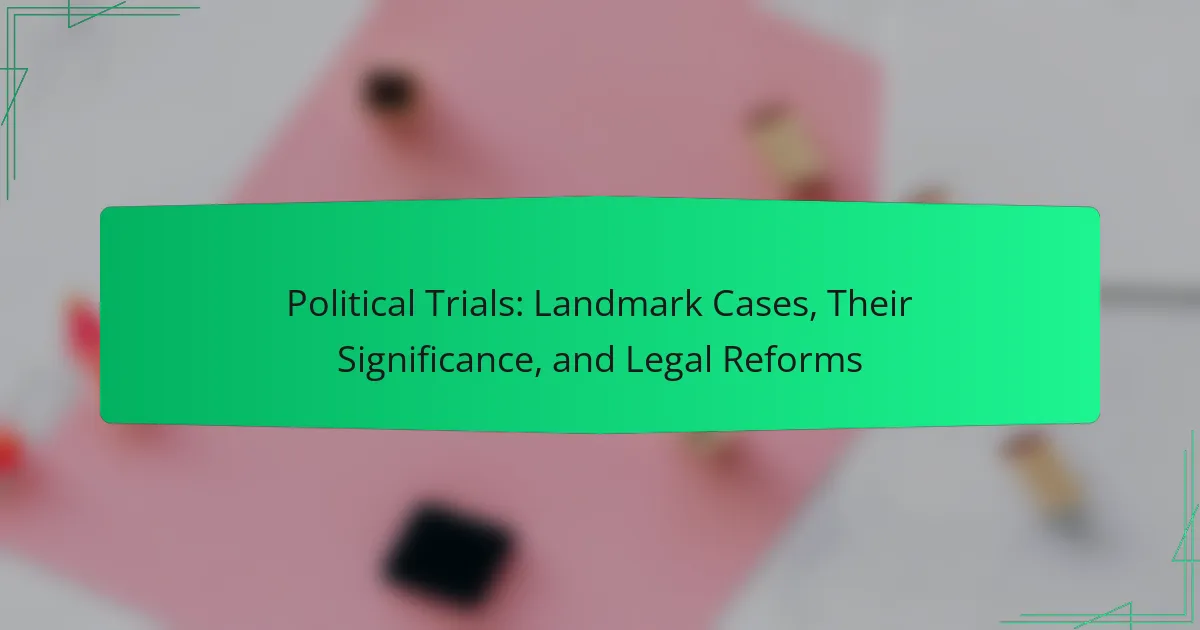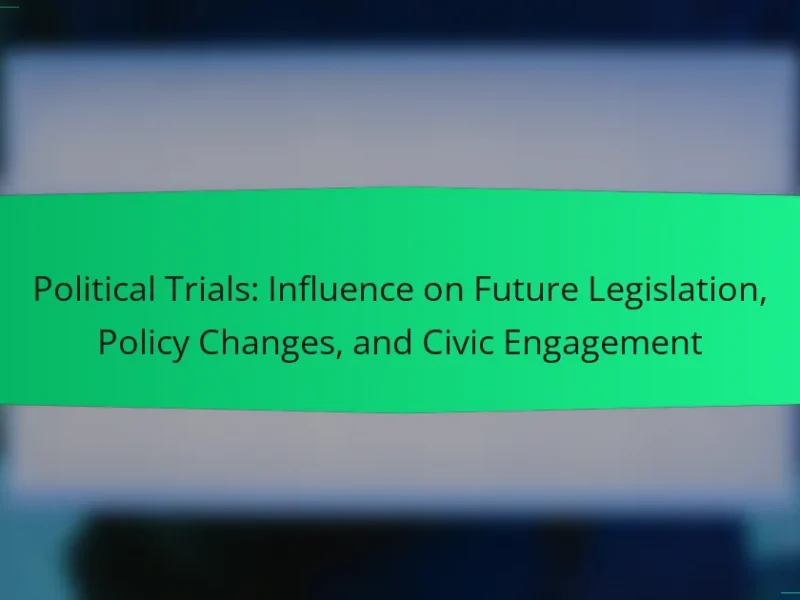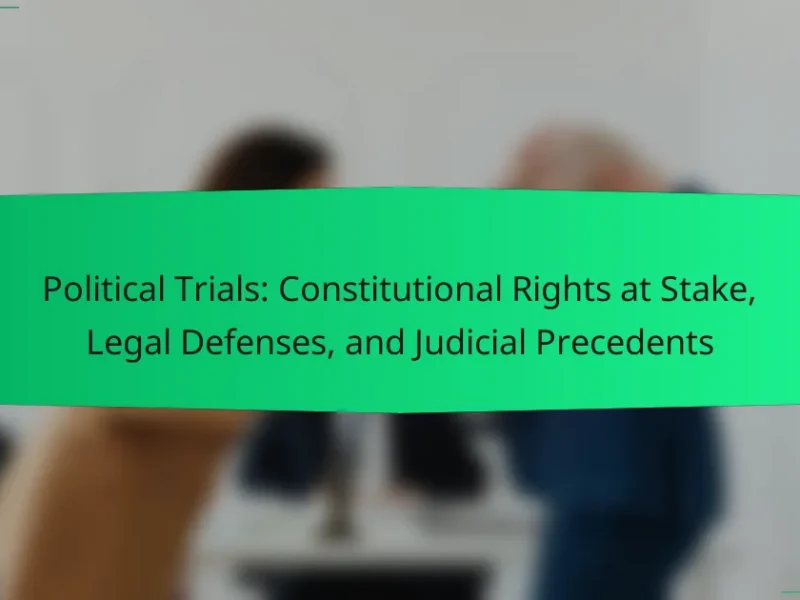Political trials are legal proceedings involving government officials or political figures accused of crimes, often emerging in contexts of political conflict or social upheaval. These trials play a crucial role in holding leaders accountable, reflecting the balance of power, and influencing public perception and political discourse. Historical examples, such as the Nuremberg Trials, highlight their significance in establishing accountability for war crimes and promoting justice. However, political trials also face challenges, including perceptions of bias, violations of due process, and potential misuse as tools for repression. This article examines landmark political trials, their implications for legal reforms, and their impact on democracy and the rule of law.
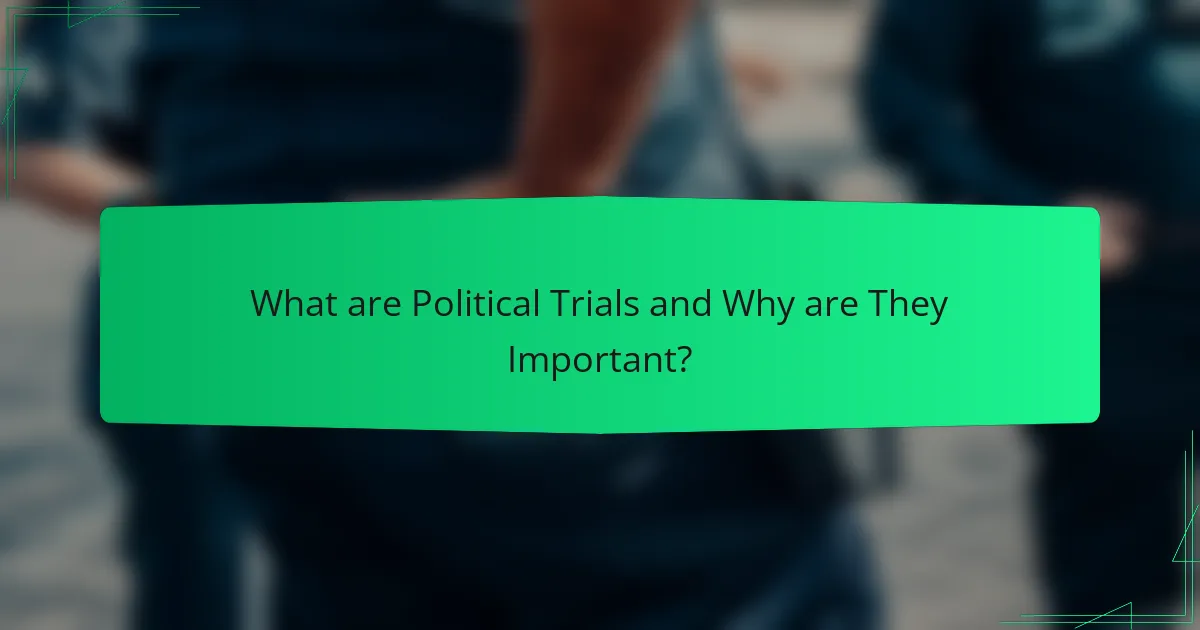
What are Political Trials and Why are They Important?
Political trials are legal proceedings that involve government officials or political figures accused of crimes. They often arise in contexts of political conflict or social upheaval. These trials can serve as a means to hold leaders accountable for their actions. They also reflect the balance of power within a political system. Political trials can shape public perception and influence political discourse. Historical examples include the Nuremberg Trials after World War II. These trials established precedents for international law and human rights. Therefore, political trials are important for promoting justice and deterring future abuses of power.
How do Political Trials differ from Regular Trials?
Political trials differ from regular trials primarily in their motivations and implications. Political trials often involve government officials or political figures accused of crimes related to their public role. These trials can be influenced by political agendas, leading to biased proceedings. In contrast, regular trials typically focus on individual criminal behavior without political overtones. Evidence in political trials may be scrutinized differently due to public interest and media coverage. Historical examples, such as the trial of former President Andrew Johnson in 1868, illustrate the unique nature of political trials. Regular trials adhere more closely to standard legal procedures and protections.
What key characteristics define a Political Trial?
Political trials are characterized by their focus on political issues rather than solely legal matters. They often involve defendants who are political figures or activists. These trials typically occur in a context where the state seeks to suppress dissent or challenge authority. The legal proceedings may lack impartiality, influenced by political motives. Evidence presented in political trials can be manipulated or fabricated to serve governmental interests. Public opinion and media coverage often play significant roles in shaping the trial’s outcome. Historical examples include the trials of dissidents in authoritarian regimes, highlighting the intersection of law and politics.
Why is the context of a Political Trial significant?
The context of a political trial is significant because it shapes public perception and influences legal outcomes. Political trials often occur during periods of social upheaval or governmental change. They can reflect the power dynamics within a society. The context determines whether a trial is seen as legitimate or a tool of oppression. Historical examples, such as the Nuremberg Trials, illustrate how context affects justice. These trials were conducted in the aftermath of World War II, highlighting accountability for war crimes. Additionally, the political environment can impact the fairness of the trial process. Context can lead to biased media coverage, affecting jury opinions and public sentiment. Understanding the context helps analyze the implications for legal reforms and human rights.
What are some Landmark Political Trials in History?
The Dreyfus Affair is a landmark political trial in history. It involved Captain Alfred Dreyfus, a Jewish officer in the French Army, wrongfully convicted of treason in 1894. The trial revealed deep-seated anti-Semitism in France and sparked widespread public debate. Another significant case is the trial of Socrates in 399 BC. Socrates was charged with corrupting the youth and impiety. His trial exemplified the tension between individual thought and state authority. The Nuremberg Trials after World War II are also notable. They prosecuted key leaders of Nazi Germany for war crimes. These trials established precedents for international law and accountability. The trial of Nelson Mandela in 1964 is another important case. Mandela was sentenced to life imprisonment for his anti-apartheid activities. His trial drew global attention to the struggle against apartheid in South Africa. Each of these trials significantly influenced legal and political landscapes in their respective contexts.
Which cases are considered pivotal in shaping political landscapes?
Landmark cases that are pivotal in shaping political landscapes include Marbury v. Madison, Brown v. Board of Education, and Roe v. Wade. Marbury v. Madison established the principle of judicial review in 1803. This case empowered the Supreme Court to invalidate laws conflicting with the Constitution. Brown v. Board of Education, decided in 1954, declared racial segregation in public schools unconstitutional. This ruling was crucial in advancing the Civil Rights Movement. Roe v. Wade, decided in 1973, affirmed a woman’s right to choose an abortion. This case significantly influenced reproductive rights and ongoing political debates. Each of these cases has had a profound impact on legal interpretations and societal norms in the United States.
What were the outcomes of these landmark trials?
The outcomes of landmark political trials often led to significant legal reforms and societal changes. For example, the Nuremberg Trials established accountability for war crimes, influencing international law. The trial of O.J. Simpson highlighted issues of race and media influence in the justice system. The Watergate scandal trials resulted in increased transparency and checks on presidential power. Each trial’s verdicts shaped public perception and legal precedents. These cases illustrate how political trials can transform legal frameworks and societal norms.
How do Political Trials influence Legal Reforms?
Political trials significantly influence legal reforms by highlighting systemic issues within the judicial system. These trials often expose flaws in existing laws and practices. For example, the Nuremberg Trials after World War II led to the establishment of international law principles. Similarly, the Watergate scandal prompted reforms in campaign finance laws in the United States. Political trials can mobilize public opinion, creating pressure for legislative changes. They can also prompt judicial reviews that lead to new interpretations of the law. Historical instances demonstrate that the outcomes of these trials often catalyze broader societal discussions on justice and accountability. Thus, political trials serve as catalysts for necessary legal reforms.
What specific legal changes have emerged from notable Political Trials?
Notable political trials have led to significant legal changes, including reforms in civil rights and due process. For instance, the trial of the Chicago Seven in 1969 prompted changes in courtroom conduct rules. It highlighted the need for fair trial protections, influencing the legal standards for jury selection and defendant rights. The Nuremberg Trials established principles of international law, emphasizing accountability for war crimes and crimes against humanity. This led to the creation of the International Criminal Court in 2002. Additionally, the Watergate scandal resulted in reforms in campaign finance laws and increased transparency in government. These trials have shaped legal frameworks, ensuring greater protections for individuals and promoting justice.
How do Political Trials affect public perception of the law?
Political trials significantly influence public perception of the law. They often highlight perceived biases within the legal system. High-profile cases can lead to increased skepticism about judicial impartiality. For example, the trial of former President Donald Trump raised questions about political motivations in legal proceedings. Such trials can polarize public opinion, leading to divided views on justice and accountability. The media portrayal of these trials further shapes public sentiment. Coverage can amplify concerns about fairness and transparency in legal processes. Ultimately, political trials serve as a barometer for public trust in the rule of law.
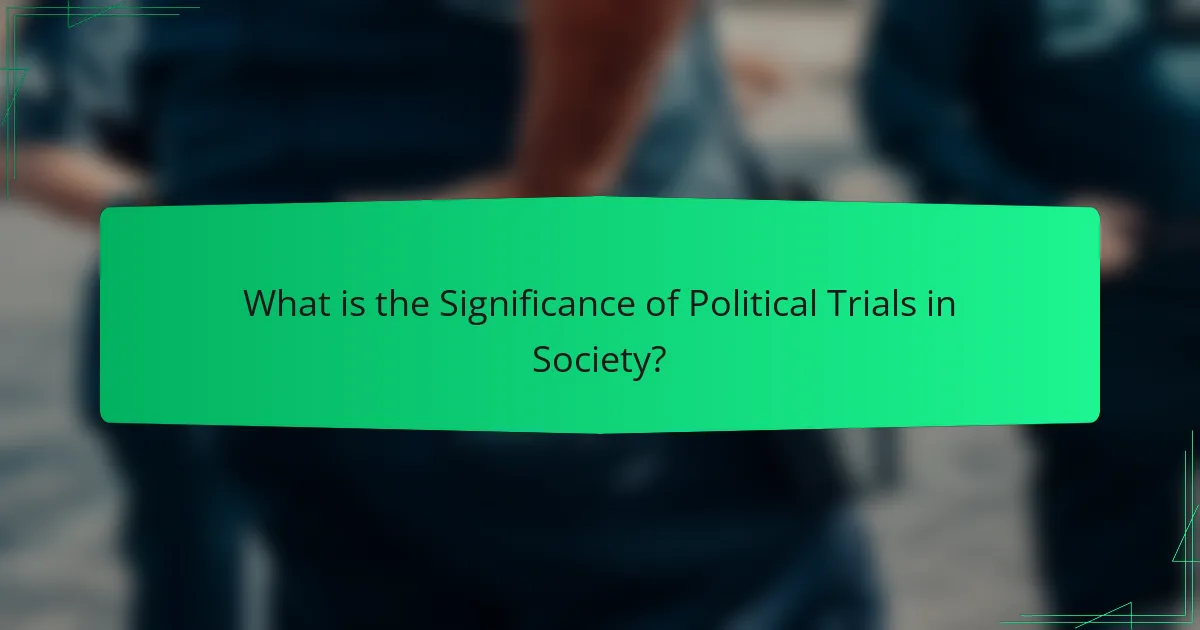
What is the Significance of Political Trials in Society?
Political trials hold significant importance in society as they often influence public perception and political discourse. They serve as a means for the state to address dissent and opposition. Historical examples, such as the Nuremberg Trials, illustrate their role in establishing accountability for war crimes. Political trials can also lead to legal reforms by highlighting injustices within the legal system. They often expose governmental abuses of power, prompting public outcry and demands for change. Furthermore, these trials can shape national identity by addressing historical grievances. Overall, political trials act as a barometer for the health of a democracy and the rule of law.
How do Political Trials impact democracy and governance?
Political trials significantly impact democracy and governance by influencing public perception and political accountability. They can serve as tools for political repression or as mechanisms for justice. For instance, high-profile trials can expose corruption and abuse of power, fostering public trust in democratic institutions. Conversely, politically motivated trials may undermine the rule of law and erode civil liberties. Historical examples include the Nuremberg Trials, which established accountability for war crimes and reinforced international law. Additionally, political trials can polarize societies, leading to increased tensions between opposing factions. Ultimately, the nature and outcome of political trials shape the landscape of governance and the health of democratic systems.
What role do they play in holding leaders accountable?
Political trials play a crucial role in holding leaders accountable. They serve as a mechanism to scrutinize the actions of those in power. Through legal proceedings, evidence is presented and examined. This process can reveal misconduct or abuse of power. Landmark cases often set precedents for future accountability. They demonstrate the principle that no one is above the law. For example, the impeachment trials of U.S. presidents have led to significant political consequences. Such trials can influence public perception and trust in government. Ultimately, they reinforce democratic values and the rule of law.
How can Political Trials serve as a tool for social change?
Political trials can serve as a tool for social change by highlighting injustices and mobilizing public opinion. They often draw attention to systemic issues within a society. High-profile cases can galvanize grassroots movements. For instance, the trial of Nelson Mandela in the 1960s spotlighted apartheid injustices in South Africa. This trial inspired international advocacy and led to significant political reforms. Political trials can also challenge existing power structures. They create platforms for marginalized voices. Ultimately, they can lead to legal reforms that address social inequalities.
What lessons can be learned from Historical Political Trials?
Historical political trials reveal the importance of judicial independence and the rule of law. These trials often highlight the dangers of political influence on legal proceedings. For instance, the Nuremberg Trials established accountability for war crimes and set precedents for international law. They emphasized that individuals, including state leaders, can be held responsible for their actions. Additionally, political trials demonstrate the need for transparency in legal processes. The trials of the McCarthy era exposed the consequences of unchecked power and the violation of civil liberties. They taught that due process must be upheld to maintain public trust in the justice system. Overall, these historical cases underscore the critical balance between justice and political power.
What common themes emerge from these trials?
Common themes in political trials include the struggle for justice, the impact of political power on legal systems, and the influence of public opinion. These trials often highlight issues of human rights violations and government accountability. They reveal the tension between state authority and individual freedoms. Additionally, the role of media coverage is significant in shaping perceptions of these cases. Historical examples show that political trials can lead to significant legal reforms. The outcomes often reflect broader societal conflicts and shifts in political landscapes.
How can these lessons inform current political practices?
Lessons from landmark political trials can guide current political practices by highlighting the importance of accountability. They demonstrate how judicial processes can uphold democratic principles. For instance, the Nuremberg Trials established precedents for prosecuting war crimes, influencing international law. This shows that legal accountability can deter future abuses of power. Furthermore, trials like Watergate emphasized the need for transparency in government actions. They reinforced the idea that political leaders must be held responsible for misconduct. These historical lessons encourage contemporary policymakers to prioritize ethical governance. By learning from past injustices, current political frameworks can promote justice and integrity.
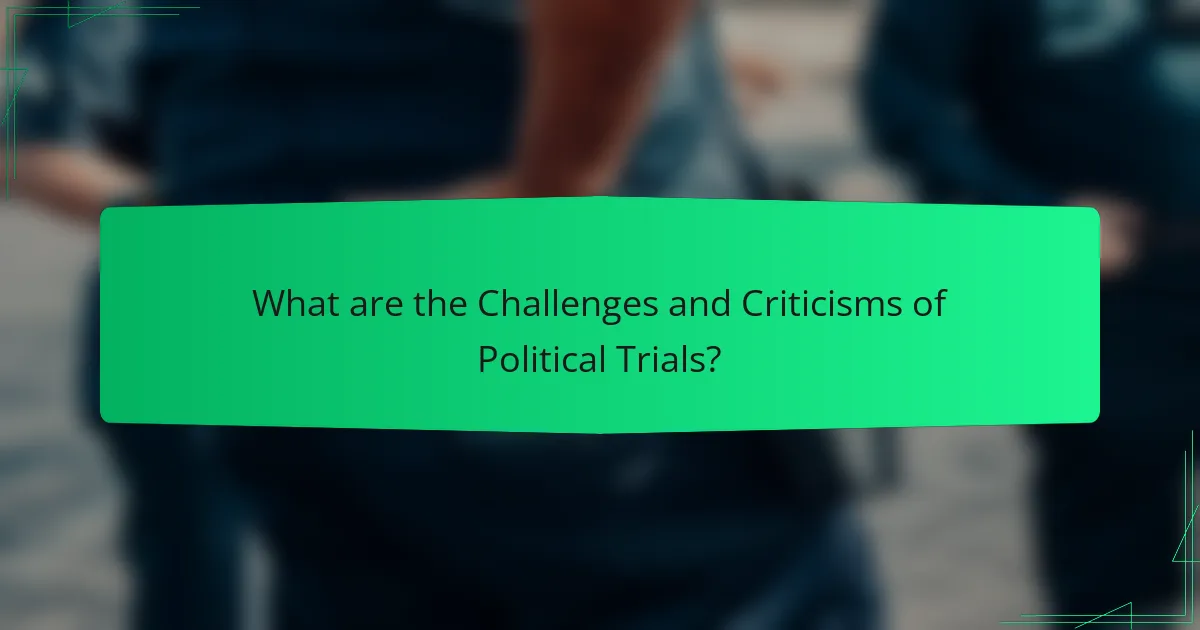
What are the Challenges and Criticisms of Political Trials?
Political trials face numerous challenges and criticisms. One major challenge is the perception of bias in the judicial process. Critics argue that political influence can compromise the impartiality of judges and juries. Another significant issue is the potential for violations of due process rights. Defendants in political trials may not receive fair treatment, leading to unjust outcomes. The use of political trials as tools for repression is also a concern. Governments may employ these trials to silence dissent or target political opponents. Additionally, public opinion can heavily sway the proceedings. Media coverage often shapes perceptions before the trial concludes, affecting the fairness of the process. Historical examples, such as the trials during the McCarthy era, illustrate these challenges. These trials often lacked transparency and were criticized for their lack of legal standards. Overall, political trials are fraught with complexities that can undermine justice.
What are the potential biases in Political Trials?
Potential biases in political trials include judicial bias, media influence, and public opinion. Judicial bias occurs when judges have personal or political affiliations that affect their impartiality. Media influence can shape perceptions and sway public sentiment before a trial concludes. Public opinion may pressure legal outcomes, especially in high-profile cases. Historical examples demonstrate these biases. The trial of the Chicago Seven in 1969 showcased judicial bias and media sensationalism. Research indicates that biased trials can lead to unjust outcomes and undermine the legal system’s integrity.
How can external influences affect the outcomes of these trials?
External influences can significantly affect the outcomes of political trials. Factors such as media coverage can shape public perception and pressure judicial decisions. Political pressure from government entities can lead to biased outcomes. Social movements or public protests can sway jurors or judges. Additionally, international scrutiny can impact trial proceedings and verdicts. Historical examples, such as the trial of the Chicago Seven, illustrate how external factors influenced judicial outcomes. In that case, public opinion and media attention played crucial roles in shaping the trial’s dynamics. Overall, external influences create an environment that can alter the course and results of political trials.
What criticisms have been raised regarding fairness and justice?
Criticisms regarding fairness and justice in political trials often center on bias and lack of impartiality. Many argue that political motivations influence judicial outcomes. This can lead to unequal treatment of defendants based on their political affiliations. Additionally, critics highlight the use of legal processes to suppress dissent. For example, high-profile cases may reflect systemic inequalities in the judicial system. Historical instances, such as the McCarthy trials, exemplify how fairness can be compromised. These trials often lacked due process and transparency. Furthermore, critics assert that public opinion can unduly sway judicial proceedings. Overall, these criticisms emphasize the need for reforms to ensure justice remains impartial and fair.
How can Political Trials be improved for better outcomes?
Political trials can be improved for better outcomes by ensuring transparency and fairness in the judicial process. Implementing independent oversight can help maintain impartiality. Legal representation for defendants should be guaranteed to uphold their rights. Clear guidelines on evidence admissibility can prevent bias. Public access to trial proceedings enhances accountability. Training for judges on political contexts can improve decision-making. Establishing a framework for appeal can address potential injustices. Historical examples show that reforms in these areas lead to more equitable outcomes.
What reforms are suggested to enhance transparency in Political Trials?
Reforms suggested to enhance transparency in political trials include the implementation of public access to trial proceedings. This ensures that citizens can observe the judicial process. Additionally, establishing clear guidelines for media coverage can promote fair reporting. Another reform is the requirement for written judgments to be published promptly. This allows the public to understand the rationale behind court decisions. Furthermore, increasing the use of technology, such as live-streaming trials, can enhance accessibility. Training judges and lawyers on transparency principles can also be beneficial. These reforms aim to build public trust and accountability in the judicial system.
How can public engagement be increased in the process?
Public engagement can be increased through transparent communication and active outreach. Providing clear information about the political trial process fosters understanding. Utilizing social media platforms can reach a wider audience effectively. Hosting community forums allows for direct interaction with the public. Engaging local organizations can amplify outreach efforts. Educational programs about political trials can increase awareness and interest. Surveys can gather public opinions and concerns, making them feel involved. Research shows that participatory approaches enhance public trust and involvement in legal processes.
What are the best practices for understanding Political Trials?
Best practices for understanding political trials include thorough research and analysis of the historical context. Understanding the legal framework is essential. Familiarizing oneself with the involved parties and their motivations aids comprehension. Analyzing the media coverage provides insights into public perception. Reviewing case outcomes and their implications reveals broader societal impacts. Engaging with expert opinions enhances understanding of complex legal arguments. Studying comparative cases offers perspective on different judicial approaches. Monitoring ongoing developments keeps knowledge current and relevant.
How can individuals stay informed about ongoing Political Trials?
Individuals can stay informed about ongoing political trials by following reputable news sources and legal analysis platforms. Major news outlets often provide real-time coverage and updates on significant trials. Subscribing to newsletters from legal organizations can also offer insights and expert opinions. Social media platforms enable direct access to updates from journalists and legal experts. Additionally, court websites often publish schedules and documents related to trials. Engaging with community forums can facilitate discussions and share information. Monitoring government and legal advocacy organization announcements can provide context and implications of trials.
What resources are available for deeper insights into Political Trials?
Resources for deeper insights into Political Trials include academic journals, legal databases, and historical archives. Academic journals like the Journal of Political Trials publish peer-reviewed articles analyzing significant cases. Legal databases such as Westlaw and LexisNexis provide access to case law and trial documents. Historical archives often contain primary sources related to landmark trials. Books authored by legal scholars also offer comprehensive analyses and contextual information. Documentaries and interviews with experts can provide additional perspectives. Online courses and lectures on platforms like Coursera can enhance understanding of political trials.
Political trials are legal proceedings involving government officials or political figures accused of crimes, often arising from political conflict or social upheaval. This article explores the significance of political trials, including their historical context and landmark cases such as the Nuremberg Trials and the Dreyfus Affair. It examines how these trials differ from regular trials, their impact on legal reforms, and the challenges they face, including bias and fairness concerns. Additionally, the article discusses the role of political trials in shaping public perception, accountability, and democracy, while highlighting best practices for understanding and staying informed about ongoing cases.
